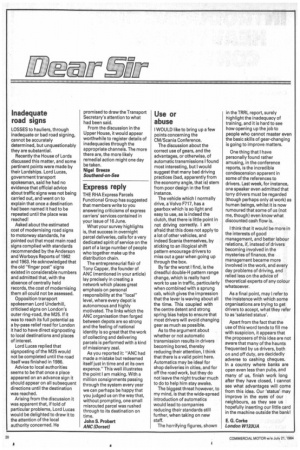Use or abuse
Page 22

If you've noticed an error in this article please click here to report it so we can fix it.
I WOULD like to bring up a few points concerning the CIVI/Scania Conference.
The discussion about the correct use of gears, and the advantages, or otherwise, of automatic transmissions I found most interesting, but I would suggest that many bad driving practices (bad, apparently from the economy angle, that is) stem from poor design in the first instance.
The vehicle which I normally drive, a Volvo F717, has a gearbox which is so light and easy to use, as is indeed the clutch, that there is little point in not driving correctly. I am afraid that this does not apply to a lot of other vehicles, and indeed Scania themselves, by sticking to an illogical shift pattern encourage drivers to miss out a gear when going up through the box.
By far the worst I find, is the dreadful double-H pattern range change, which is really hard work to use in traffic, particularly when combined with a sprung cab, which gives the impression that the lever is waving about all the time. This coupled with the centre detent and strong spring bias helps to ensure that most drivers will avoid changing gear as much as possible.
As to the argument about whether or not automatic transmission results in drivers becoming bored, thereby reducing their attention, I think that there is a valid point here. Automatics may be ideal for shop deliveries in cities, and for off the road work, but they do not leave the night trucker much to do to help him stay awake.
The biggest threat however, to my mind, is that the wide-spread introduction of automatics would lead to companies reducing their standards still further, when taking on new staff.
The horrifying figures, shown in the TRRL report, surely highlight the inadequacy of training, and it is hard to see how opening up the job to people who cannot master even the basic skills of gear-changing is going to improve matters.
One thing that I have personally found rather amusing, in the conference reports, is the incredible condescension apparent in some of the references to drivers. Last week, for instance, one speaker even admitted that lorry drivers must be regarded (though perhaps only at work) as human beings, whilst it is now rumoured that some of us (not me, though) even know what discounted cash flow is.
I think that it would be more in the interests of good management, and better labour relations, if, instead of drivers becoming involved in the mysteries of finance, the management became more involved in the work, and every day problems of driving, and relied less on the advice of theoretical experts of any colour whatsoever.
As a final point, may I refer to the insistence with which some organisations are trying to get drivers to accept, what they refer to as 'salaried status'.
Apart from the fact that the use of this word tends to fill me with suspicion, it appears that the proposers of this idea are not aware that many of the haunts frequented by us drivers, both on and off duty, are decidedly adverse to cashing cheques. In a country where banks are open even less than pubs, and many of us, finish work long after they have closed, I cannot see what advantages will come from this idea. Our 'status' may improve in the eyes of our neighbours, as they see us hopefully inserting our little card in the machine outside the bank!
E. G. Corke London W133UA




















































































